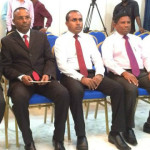The Criminal Court has held the third hearing into the trial of 23 year-old Swedish national Filip Eugen Petre, who stands accused of crashing a quad bike on Kuredu Island Resort that resulted in the death of a young newlywed British couple during their honeymoon vacation.
Petre faces charges of disobedience to order for his alleged role in driving the quad bike at the resort on August 6, after it crashed into a tree whilst carrying British nationals Emma and Jonathan Gray.
As the trial resumed today, the prosecution argued that Petre’s lawyer had confessed during the last hearing that his client had been driving the quad bike as it crashed – a view backed by presiding judge Judge Abdul Baary Yousuf.
According to Article 88 of the Penal Code, disobedience to order is a crime and according to Article 88(c), if the result of violating the article is linked to a death, the case shall be dealt accordingly to Islamic Sharia. The prosecution has previously contended that under Islamic Sharia, if an offender’s action is found to caused the death of a person, the offender shall be punished.
Judge Abdul Baary Yousuf declared in court today that Petre’s lawyer had himself confessed during the trial’s first hearing that his client had driven the quad bike carrying Emma and Jonathan Gray as it crashed on the tourist property. As a result of this confession, the judge said the state did not have to produce any evidence to prove Petre was the driver of the vehicle during the collision.
Representing the prosecution, State Attorney Aishath Fazna also contended that because Petre had “confessed” to driving the Quad Bike, she did not believe the state had to produce evidence to support this assumption.
However, Petre’s lawyer Areef Ahmed responded that his client had not directly confessed to driving the quad bike and argued that his client continued to deny the charges against him. Areef additionally claimed that the judge could not declare a verdict regarding the alleged confession during the previous hearing.
Areef contended that his confession could be withdrawn before the case reached to a conclusion, but the state attorney argued that after confessing in the trial there was no way it can be withdrawn.
Previous hearing
In the previous hearing of the trial, Petre’s lawyer told the court that the couple requested Petre drop them at their room, and that the court had to determine the responsibility of Petre in the incident.
However, the state attorney said at the time that witnesses saw Petre asking the couple whether they wanted a ride.
Petre suffered injuries in the accident and was brought to Male’ for medical treatment.
The first hearing of the case was held last Thursday. During the intial hearing, Petre’s lawyer Areef Ahmed contended that his client could not be charged under Islamic Sharia because his client is non-Muslim.
He told the judge that the crime Petre was accused of committing was carrying people on a vehicle which was not intended to carry passengers, and that his criminal actions started from that moment.
Judge Abdul Baary Yousuf asked Areef to explain this action of his client, to which Areef replied that this was the normal procedure at the resort.
Under the Maldivian constitution, Sharia is turned to by the courts in areas established law does not cover.






Sounds to me like a kangaroo court.
In most legal systems, except when a stipulation is made, which is a specific, formal, procedure, a statement by a lawyer is not evidence. No statement regarding the facts of the case by Petre's lawyer is binding on Petre, so Petre cannot be held to have "confessed" anything.